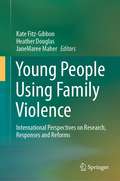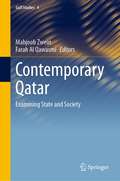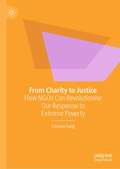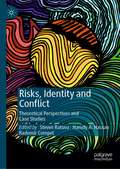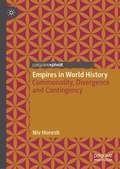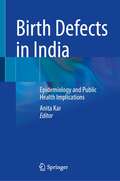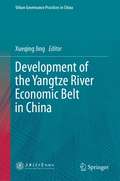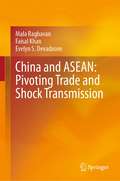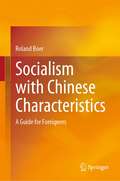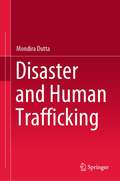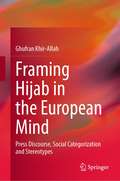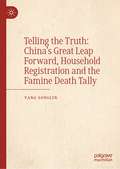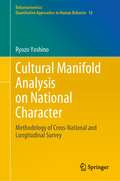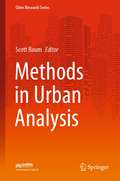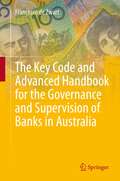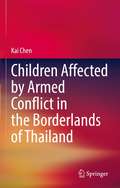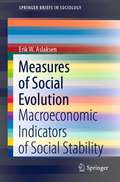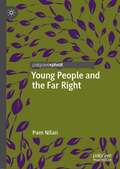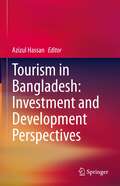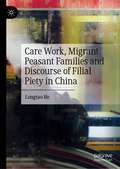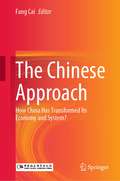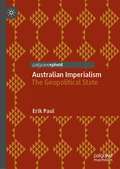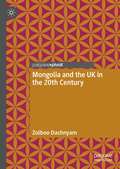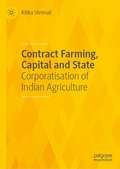- Table View
- List View
Young People Using Family Violence: International Perspectives on Research, Responses and Reforms
by Kate Fitz-Gibbon Heather Douglas JaneMaree MaherThis book examines the use of violence by children and young people in family settings and proposes specialised and age-appropriate responses to these children and young people It interrogates the adequacy and effectiveness of current service and justice system responses, including analysis of police, court and specialist service responses. It proposes new approaches to children and young people who use violence that are evidence based, non-punitive, and informed by an understanding of the complexity of needs and the importance of age appropriate service responses.Bringing together a range of Australian and International experts, it sheds new light on questions such as: How can we best understand and respond to the use of family violence by young people? To what extent do traditional family violence responses address the experiences of adolescents who use violence in family settings? What barriers to help seeking exist for parental and sibling victims of adolescent family violence? To what degree do existing support and justice services provide adequate responses to those using adolescent family violence and their families? In what circumstances do children kill their biological and adopted parents?The explicit focus on child and adolescent family violence produces new knowledge in the area of family violence, which will be of relevance to academics, policy makers and family violence practitioners in Australia and internationally.
Contemporary Qatar: Examining State and Society (Gulf Studies #4)
by Mahjoob Zweiri Farah Al QawasmiThis book addresses critical topics and unanswered questions on the contemporary state of Qatar. Drawing together a unique combination of authors that have researched the Gulf Cooperation Council (GCC) in general, and the state of Qatar specifically, each author provides an in-depth empirical analysis of Qatar’s current social, political, and economic landscape against a historically informed backdrop. Cognizant of its rapid state of flux, the contributors collectively provide a comprehensive overview of the intersection of these respective areas, delving into the historical creation of Qatar as a state, its politics and systems of governance, its economic strata and reliance on natural resources, its society and national identity, its new and thriving sports culture, and, most topically, matters of diplomacy, the 2017 blockade, and its armed forces. Owing to the contributors’ invaluable firsthand experience and knowledge of Qatar, this book provides valuable insights into this nation, at once old and new, and its intertwined trajectories in its socio-political and economic positionality within the region. This book is an invaluable resource for students and scholars researching the Middle East generally, and the Gulf, specifically, with interests in topics such as politics and international relations, political economy and foreign policy, development, sources of social change, societal activism, popular culture, and the various elements of identity.
From Charity to Justice: How NGOs Can Revolutionise Our Response to Extreme Poverty
by Vincent FangThis book focuses on the ethical demands of extreme poverty and develops a political theory of practical change. Welding together political realism and moral aspirations, it argues that a re-imagined form of development NGO can help the global North break free from the dominant and persistent charity paradigm and drift towards a justice-based understanding of extreme poverty. It offers an original explanation of why the charity paradigm persists and why the “justice not charity” messages from development NGOs have changed few minds. The author argues that anyone concerned with a paradigm shift from charity to justice need to radically rethink the problem of political communication: who should communicate what messages about extreme poverty in what ways? Based on a rational choice critique of the competitive development NGO sector, the author calls for sector-wide reform and the emergence of a new political agent – the Avant-garde NGO - which transcends the charity frame that NGOs currently find themselves locked in. Further, inspired by literary theory and social psychology, he offers a fresh account of how the Avant-garde NGO could, through reflective public engagement, induce attitude change and lead genuine social and political reform.
Risks, Identity and Conflict: Theoretical Perspectives and Case Studies
by Steven Ratuva Hamdy A. Hassan Radomir CompelThis volume explores the complex interrelation between risk, identity and conflict and focuses specifically on ethnicity, culture, religion and gender as modes of identity that are often associated with conflict in the contemporary world. It draws on theoretical perspectives as well as pays special attention to analysis of diverse case studies from Africa, Middle East, Europe, East and Southeast Asia and Latin America. Using various analytical tools and methodologies, it provides unique narratives of local and regional social risk factors and security complexities. The relationship between risk and security is multidimensional and perpetually changing, and lends itself to multiple interpretations. This publication provides a new ground for theoretical and policy debates to unlock innovative understanding of risk through analyses of identity as a significant factor in conflict in the world today. At the same time, it explores ways to address such conflicts in a more people-centered, empowering and sustainable way.
Empires in World History: Commonality, Divergence and Contingency
by Niv HoreshThis study focuses on Empires, from an economic historical perspective. In doing so, it relates current debates in international relations (IR) and politics to the vexed legacy of empires in the past.The book includes analyses of the comparative scholarly literature on Empire in Antiquity, and Empire in the Early Modern and Modern Ages, asking the question if the United Sates is an Empire, and if China an emerging Empire.It contributes to the field given its interdisciplinarity, bringing together both historical and IR insights into world systems in times past. In addition it draws out four key points of separateness between pre-modern and modern empires, and emphases specific economic data. Further to that, the book advances the notion of the emergence of “empires from within” in the 21st century, that is nation-states becoming more multi-ethnic while often stepping back from globalization. And finally it offers future scenarios for the evolution of empires in a Schumpeterian post-industrial world.
Birth Defects in India: Epidemiology and Public Health Implications
by Anita KarThis book presents the epidemiology of birth defects and their public health and social implications in India. As neglected childhood disorders, birth defects remain invisible in global maternal and child health dialogues. Birth defects services are emerging in India. This book approaches birth defects from a public health perspective, identifying the core functions of a birth defects service. Keeping in mind the complex task of providing multidisciplinary services for children with disabilities and complex medical conditions, the book examines the basic public health activities that have been put in place to address these conditions in India. The book describes birth defects surveillance and the challenges of acquiring accurate and timely data on birth defects against the background of India’s mixed health system. It discusses opportunities for prevention of birth defects and describes the structure and function of an emergent genetic service. It explores issues related to an integrated service for children with special healthcare needs, such as screening, early intervention, and rehabilitation. Furthermore, it describes the impact of these conditions on caregivers, including birth defects stigma. This book not only addresses a knowledge gap in the field of public health in India, but also explores the broader issues of services for children with disabilities and disabling conditions in low and low-middle income settings where access to health care is not universal. Given the depth and breadth of its coverage, the book offers an essential resource for birth defects researchers, researchers in the field of maternal and child health, public health/ global health, disability researchers, and researchers from the fields of rehabilitation sciences, nursing and anthropology. This book will be a valuable read for social medicine/community medicine departments, global health courses, and public health schools in India and other low middle-income countries.
Development of the Yangtze River Economic Belt in China (Urban Governance Practices in China)
by Xueqing JingThis book focuses on the level of industrial synergy development of the Yangtze River Economic Belt in China. The main contents include: Linkage Development of the Manufacturing and Logistics Industries of the Yangtze River Economic Belt, Cooperative Development of the Information Industry in the Yangtze River Economic Belt, Coordination and Deepening of Agricultural Development in the Yangtze River Economic Belt, Coordinated Development of the Ecological Environment in the Yangtze River Economic Belt, Development of Regional Financial Integration in the Yangtze River Economic Belt, Port Coordinated Development of the Yangtze River Economic Belt, as well as Industrial Division of the Yangtze River Economic Belt.
China and ASEAN: Pivoting Trade and Shock Transmission
by Mala Raghavan Faisal Khan Evelyn S. DevadasonThis book highlights the critical relationship between China and the Association of Southeast Asian Nations (ASEAN) associated with its trade interdependency. As the largest trade partner in the region, China has not only presented itself with opportunities for ASEAN to tap its market, but also created great challenges for the region. The fundamental question that this book addresses, therefore, is whether China’s engagement with ASEAN comes at a cost for the latter following from the systemic risks tied to the China-centric supply chains in the region. The trade interactions between China and ASEAN, though extensively explored, are less understood in the context of its influence over the region amidst the recent changing dynamics that follow from China’s global engagement and backlash from major powers. The book therefore resolutely rises against stereotypes and clichés, making readers reconsider many oversimplified assumptions of the benefits of trade engagement where economies are interconnected through complex production chains.
Socialism with Chinese Characteristics: A Guide for Foreigners
by Roland BoerThis book covers the whole system of Socialism with Chinese Characteristics, dealing with Deng Xiaoping’s theory, the socialist market economy, a moderately well-off (Xiaokang) society, China’s practice and theory of socialist democracy, human rights, and Xi Jinping’s Marxism. In short, the resolute focus is the Reform and Opening-Up. Socialism with Chinese Characteristics is one of the most important global realities today. However, the concept and its practice remain largely misunderstood outside China. This book sets to redress such a lack of knowledge, by making available to non-Chinese speakers the sophisticated debates and conclusions in China concerning socialism with Chinese Characteristics. It presents this material in a way that is both accessible and thorough.
Disaster and Human Trafficking
by Mondira DuttaThe book highlights the root cause of human trafficking and analyses how factors of vulnerability affect the marginalized, especially during and after a disaster. Human trafficking like other studies on disaster research, needs to be tackled from various perspectives such as empowering the vulnerable people, creating awareness, strengthening the disaster risk reduction measures and creating a common platform to fight the vicious circle by breaking its continuity and making strategies victim centric and people friendly.The book adapts a multidisciplinary approach embedding concepts from political, social, economic and anthropological perceptions. The discourse in the book revolves around the emotional and psycho-social stress factors including weak implementation of laws and policies at various levels. The content weaves around three themes -- magnitude and interlinks between disaster and human trafficking; policies and protocols on disaster risk reduction and human trafficking and community participation and institutional support. Through these themes, the volume works on identification of the vulnerable areas which are not in compliance with the Sendai Framework of Action, 2015 in the backdrop of the Disaster Management Act of India, 2005. The volume will be of immense interest to a wide range of practitioners, researchers, academicians, policy makers, political leaders, gender experts, international organizations, disaster management authorities, civil society organisations, and scholars working in the area of human rights in general and trafficking in particular. Note: This research was funded by Indian Council of Social Science Research (ICSSR).Human Trafficking is complex, layered and lies at the intersections of multiple vulnerabilities, gender being among the most significant ones. This gets exacerbated during both natural and human made disasters. Any attempt to either understand or address it will be fraught with challenges if women and girls' unique vulnerabilities, as well as their needs, voice, choice, agency and safety is not centre-staged in any effort. Mondira's book does exactly that...it succinctly and in simple words explores the compounding discriminations, including structural inequalities, that cause and result in women and girls differential gendered vulnerabilities to being trafficked during disasters. Once this is understood, the solutions can be specific, gender responsive, and sustainable.- Anju Dubey Pandey, Gender Responsive Governance and Ending Violence against Women Specialist, UN Women, New Delhi, India
Framing Hijab in the European Mind: Press Discourse, Social Categorization and Stereotypes
by Ghufran Khir-AllahThis book compares how British and Spanish media have covered the French ban on hijab wearing in public schools. Using interdisciplinary approaches ranging from social psychology, semiology, cognitive linguistics and sociology, it seeks to explain how the hijab is interpreted as a sign by the mainstream culture, and hijab-wearing Muslim sub-culture. Based on an analysis of 108 articles published in the national newspaper from each context, this comparative study operates on two levels: a micro-level analysis of within-culture variations between mainstream culture and the hijab-wearing women; and a macro-level analysis of the cross-cultural variation between the British context and the Spanish one. The result is a profound insight into how each discourse reveals the different level of social integration of hijab-wearing women in these two different contexts. The Analysis methodology combines between Critical Discourse Analysis CDA, Conceptual Metaphor Theory CMT, and Cognitive Linguistics CL. The book introduces a novel analysis methodology for social and linguistic sciences. It is the Cognitive Critical Discourse Analysis methodology CCDA.
Telling the Truth: China’s Great Leap Forward, Household Registration and the Famine Death Tally
by Songlin YangThis book discusses what is often called the “Great Leap Famine”, which occurred in China during the years from 1959 to 1961. Scholarly consensus suggests that 30 million Chinese perished. Yang Songlin’s book provides an evidence-based, systematic and substantial rebuff, concluding that a much smaller number of deaths can be verified. This book is of interest to scholars of China and Chinese development and politics, economists, and demographers.
Cyber Security, Artificial Intelligence, Data Protection & the Law
by Robert Walters Marko NovakThis book provides a comparison and practical guide of the data protection laws of Canada, China (Hong Kong, Macau, Taiwan), Laos, Philippines, South Korea, United States and Vietnam. The book builds on the first book Data Protection Law. A Comparative Analysis of Asia-Pacific and European Approaches, Robert Walters, Leon Trakman, Bruno Zeller. As the world comes to terms with Artificial Intelligence (AI), which now pervades the daily lives of everyone. For instance, our smart or Iphone, and smart home technology (robots, televisions, fridges and toys) access our personal data at an unprecedented level. Therefore, the security of that data is increasingly more vulnerable and can be compromised. This book examines the interface of cyber security, AI and data protection. It highlights and recommends that regulators and governments need to undertake wider research and law reform to ensure the most vulnerable in the community have their personal data protected adequately, while balancing the future benefits of the digital economy.
Cultural Manifold Analysis on National Character: Methodology of Cross-National and Longitudinal Survey (Behaviormetrics: Quantitative Approaches to Human Behavior #10)
by Ryozo YoshinoThis book first presents an overview of the history of a national character survey by the Institute of Statistical Mathematics that has been conducted for more than 65 years. The Japanese National Character Survey, launched in 1953, is a rare longitudinal survey in the world of survey research based on rigorous statistical sampling theory, motivating other countries to launch similar longitudinal surveys, including the General Social Survey (GSS), the Allgemeine Bevölkerungsumfrage der Sozialwissenschaften (ALLBUS, German General Social Survey (GGSS)), Eurobarometer, and others. Since the early 1970s, the Japanese survey has been extended as a cross-national survey for more advanced research of the Japanese national character in a comparative context. Second, the book explains the paradigm of cross-national studies called the Cultural Manifold Analysis (CULMAN), developed in the longitudinal and cross-national surveys, with practical examples of analysis. This explanation will help helps a wide range of readers to better understand the cross-national comparative surveys of attitudes, opinion, and social values as basic information for evidence-based policymaking and research.
Methods in Urban Analysis (Cities Research Series)
by Scott BaumThis book highlights major quantitative and qualitative methods and approaches used in the field of urban analysis. The respective chapters cover the background and relevance of various approaches to urban studies and offer guidance on implementing specific methodologies. Each chapter also provides links to real-world examples. The book is unique in its focus on Australian examples and subject matter, presented by recognized experts in the field.
The Key Code and Advanced Handbook for the Governance and Supervision of Banks in Australia
by Francesco de ZwartThis Key Code and Handbook examines the corporate governance and accountability of Major Banks, their directors and executives which were the central focus of bank, Supervisor, Regulator and governmental activity and public scrutiny in 2018 and 2019. This book explores this responsibility focus by providing evidence from the Global Financial Crisis and beyond with both APRA and ASIC investigating illegal conduct, misconduct and conduct which was below the level of community expectations. This book discusses how the Royal Commission into misconduct in the banking and financial services industry has already given rise to a detailed Final Report whose recommendations are still being put into effect. Further, this book uses evidence provided by the large number of Prudential Standards issued by APRA and investigations into the conduct of Major Banks by Regulators. This book explores governance variables – over 1,700 in number and grouped into 159 ‘key groupings’ or separate categories – which are all indexed to 28 governmental, regulatory and supervisory reports and documents to create a governance code and commentary specifically tailored to Australian banks. Each governance variable is modelled on the Stage 1 Relational Approach contained in Enhancing Firm Sustainability Through Governance. Given the huge interest in the governance of banks, Parts 1 and 2 – explaining the Relational Approach - of Stage 1 were recently published in November 2018 and June 2019 in the Australian Journal of Corporate Law. This book is the largest reference book and handbook in publication worldwide containing the structures, mechanisms, processes and protocols – the checks and balances we call ‘governance variables’ – that deeply addresses and explains banking accountability and regulation in Australia.
Children Affected by Armed Conflict in the Borderlands of Thailand
by Kai ChenThis book explores how children have been affected by armed conflict in the borderlands of Thailand, particularly in the region abutting the Thailand-Myanmar border, and in the most southern part of Thailand. The author argues that the Thai government has made great efforts to protect children from armed conflict in these borderlands. The author analyzes the obstacles facing the Thai government in protecting children from armed conflict in the borderlands, and advances alternative solutions for how the Thai government might better protect children from armed conflict in the foreseeable future. This book not only opens a window for future research on children affected by armed conflict in the borderlands of Thailand and beyond, but also contributes to the breadth of perspective and depth of expertise in related fields, such as studies of human insecurity. It is relevant to scholars, graduate students, and policymakers interested in the impact of armed conflict on children.
Measures of Social Evolution: Macroeconomic Indicators of Social Stability (SpringerBriefs in Sociology)
by Erik W. AslaksenThis book extends a previously published model of social evolution by using macroeconomic measures to indicate both the current state of the society, and its evolutionary trajectory. This model considers society as a system of interacting elements evolving through stages of increasing strength of interaction and complexity of structure. It measures society in constituting the world collectively, with nation-states as the elements, here described through macroeconomic measures such as GDP, government expenditure, and inequality. The economic data presented indicates that this stage is approaching the next evolutionary step, which is either the formation of a world society of nations, with an associated overarching common infrastructure absorbing some of the sovereign functions of nation-states as they exist today, or as a society of competing groups of nations, each bound by alliances and bilateral agreements. The book explores how the former faces great obstacles in the form of nationalism and a misunderstood concept of sovereignty, and poses that it is in an embryonic stage. The author poses that it is this structure that would be best equipped to handle common challenges, such as the environment and global warming, and topically, pandemics. A novel interdisciplinary text in social complexity, this book is of interest to researchers in socio-economic fields.
Young People and the Far Right (Alternatives and Futures: Cultures, Practices, Activism and Utopias)
by Pam NilanThis book looks at how young people get attracted to the Far Right, especially young white men. We may never know why a young individual ends up there, yet two things are obvious. First, Far Right propaganda appeals to the fantasy imagination and to the emotions. Second, supporting the Far Right is a decision often made by digitally-networked 15-25 year olds looking for answers and wanting to express their anger. However, many later become aware of a yawning gulf between the ideal future they envisioned, and what happens in the here and now. Accounts of the Far Right often focus on terrorist events, plots or extreme acts of violence. However, the emphasis here is on rather ordinary young people and how they get involved in a social movement that promises adventure and belonging. The aim is to better understand how their hate practices are framed and channeled by the persuasive discourse of the Far Right.
Tourism in Bangladesh: Investment and Development Perspectives
by Azizul HassanThis edited volume uniquely explores the extensive themes and frameworks of tourism development and investment in Bangladesh. The book focuses on outlining the present investment and development scenario of Bangladesh in order to suggest some solutions to current issues. Considering that Bangladesh has a population of over 170 million, the country possesses an abundance of possibilities for tourism. In recent years, Bangladesh has experienced steady growth in its economy and socio-cultural developments. Currently, there is very limited knowledge of or research into tourism in Bangladesh, even though it is a multifaceted and fast-growing industry.This book makes an important contribution to representing and exploring diverse aspects of tourism in Bangladesh for local and international benefit. This book provides insights into the stronghold of a social class having the ability to spend for tourism and leisure activities, which has prompted the country to pay further attention to the development of its tourism industry. This book emphasizes that the importance of tourism is undeniably on a continuous rise in Bangladesh, which in turn deserves the appropriate attention from academic research.
Care Work, Migrant Peasant Families and Discourse of Filial Piety in China
by Longtao HeThis book examines the experiences of migrant peasant workers in China who care for parents diagnosed with cancer and explores to what extent contextual changes after the economic reform initiated in 1978 affected practices and experiences of caring. In his own attempt to develop a localized methodology, the author considers identifying similarities between Chinese philosophies and Foucault’s theories as the key step for localizing Foucauldian discourse analysis. Three similarities are located and articulated with regard to filial care. Firstly, the complexity of discursive relations identified by Foucault resembles the complicated Chinese notion of the relationality of the self. Secondly, both sides have a tendency to look back to ancient times for solutions and to critique the notion of ‘progress’ in modernity. For Foucault, the way to attain freedom or agency is through technologies of the self, such as speaking truth (parrhesia). Lastly, both value action and practice in their theories. The book then analyzes, through this localized methodological approach, statements made by migrant peasant workers to take readers through their discursive mechanisms to construct filial piety in relation to their subjective care experiences.
The Chinese Approach: How China Has Transformed Its Economy and System?
by Fang CaiThis volume introduces readers to the achievements made in the context of China’s reform and opening up. It tells China’s story with regard to twelve aspects: the reform path, opening up, macro-economy, regional development, the “three rural” policy, poverty alleviation, industrial development, scientific and technological leadership, ecological civilization, human resources, social security, and income distribution. On the one hand, China’s successes and lessons learned in this regard – e.g. the establishment of special economic zones and pilot zones in advance, followed by the implementation of regional development strategies – can be condensed into a general sense of Chinese wisdom. On the other, China’s participation in economic globalization and global economic governance can serve as a role model, helping developing countries overcome poverty and move towards modernization. As China accounts for nearly one fifth of the world’s total population, the problems and difficulties that it faced at the beginning of reform and opening up are similar to those of many developing countries; therefore, it can provide valuable guidance for developing countries in the form of Chinese wisdom and Chinese approach.
Australian Imperialism: The Geopolitical State
by Erik PaulIn his critical study of Australian imperialism, Erik Paul analyses the making, character and contours of the geopolitical state from the time of the British invasion and colonisation to the present, expanding the country’s continental political and economic power. War is the crucible for its hegemonic power, nationalism, and politics. The book exposes and dissects capitalist imperialism to control and manage a growing population and to impose the grand strategy of a US client state. The geopolitics in the partitioning of the earth and the exploitation of people and the biosphere continue to create major conflict, inequality, and human suffering. Australia plays an important role in the intensification of the struggle among major powers and in the outcome of an expanding global ecological and hegemonic crisis. But the existing Australian state of exception constitutes a major obstacle to a reconciliation with China and to a peaceful regional and world order.
Mongolia and the UK in the 20th Century
by Zolboo DashnyamThis book explores the history of Mongolia's relations with external powers via the prism of the relationship with the UK, drawing on archival documents and other historical resources in different languages such as Russian, Chinese and Mongolian. From the early history of the Mongolian state as part of the socialist alliance, Mongolia has had relations with the UK, which was the first western nation to recognize Mongolian independence in 1963. The evolving political situation in Mongolia and the world is here refracted through the relationship with the UK. Further, it introduces readers to the cultural and ideological differences between Mongolian foreign relations belong to different historical periods. This book will be of interest to scholars of Asia, of the post-socialist world, and of the role of the UK in the world.
Contract Farming, Capital and State: Corporatisation of Indian Agriculture
by Ritika ShrimaliThe book argues that an increasing corporatisation of agriculture in India that is enabled by its neoliberal State, in the name of ‘development’, is contributing towards deepening of inequality in the rural India.It says that Contract Farming (CF) acts as a conduit that enables the coming together of myriad production relations (mercantile, finance, productive) to sell agri-commodities to the capitalist peasant. It is an accumulation strategy that brings together various factions of domestic and foreign capital together. It shows that CF as an accumulation strategy is enabled by an active interventionist state and this neoliberal Indian state mediates the relation between the agri-capital and Indian peasantry. The book further analyzes contract farming as a part of the totality of the capitalist mode of production in context of developing countries with a large agrarian base--- asking three fundamental questions – what is CF, how and why is it done and what are the implications of it.
